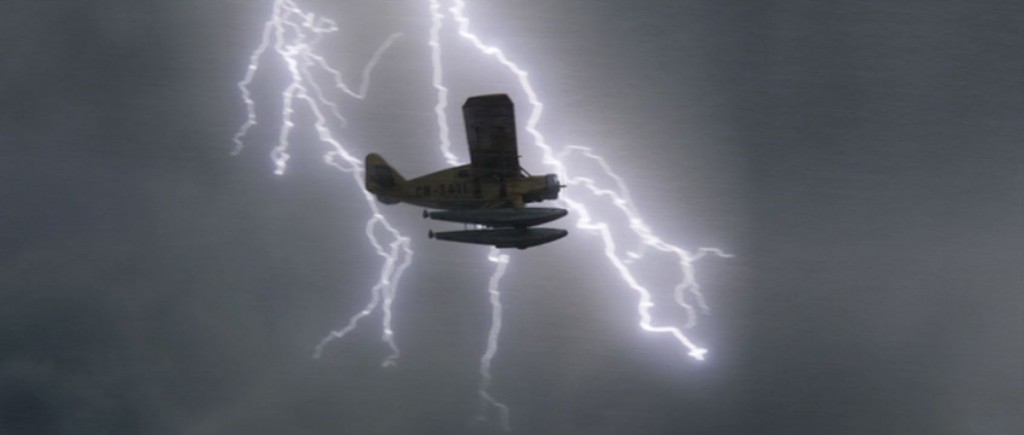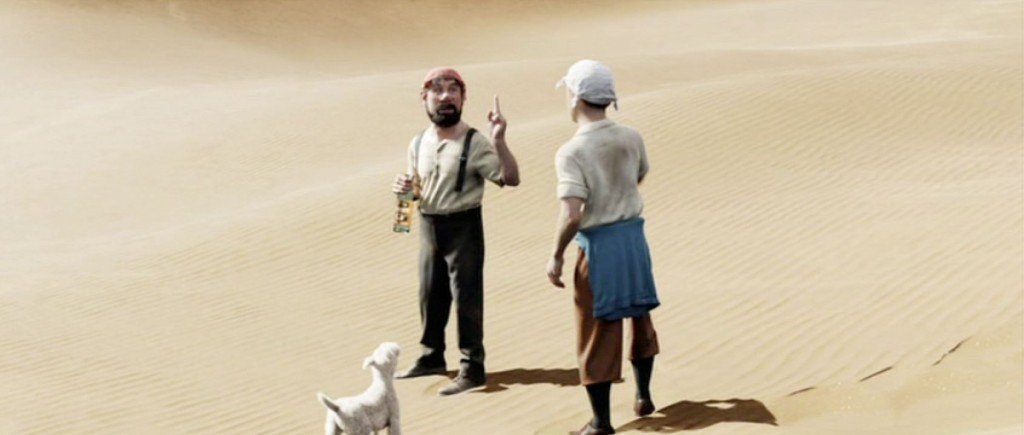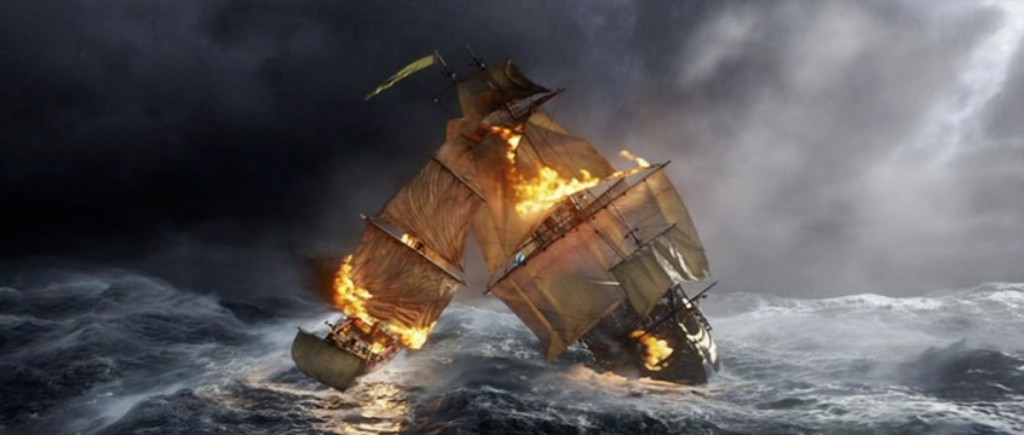Spielberg: The Adventures of Tintin part 6
Tintin, obsessed now, steers the plane carrying himself, his dog, Haddock and two bad guys into a storm Haddock calls “that wall of death,” leading to the first of Tintin‘s definitive set pieces, an action beat involving the plane, the storm, a boy pilot, a drunk, a bottle of medicinal alcohol, a sudden desert, a supercharged belch, a crash, an ill-timed parachute and a deadly propeller blade. Definitive because it would have been unstageable in any convincing way outside of 3D computer animation. The entirety of Tintin is gorgeous, but it’s sequences like this (and, to a lesser extent, the chase through the streets with Snowy after Tintin in the crate) where the movie comes into its own. Note as well that the “wall of death” sequence is rooted in character (“We can’t go back” and “I can’t stop drinking”) and, as in any true action sequence, it changes the direction of the story while it’s happening. Tintin and Haddock go into the storm as an obsessed boy and an unwilling coward, but the sequence ends with Tintin awakening Haddock’s courage and Haddock and Snowy rescuing Tintin from certain death — the first time anyone in the movie has shown a lick of responsibility toward anyone else. The principals go into the sequence as a boy, a man and a dog, but the emerge from it a family, that most sacred of institutions in the Spielberg ethos.
The team is now a family, but this newly-minted family is lost in the desert. The desert is dry, and so is Haddock — he’s sobering up. The dunes, for him, become waves. “I must get back to the sea,” he says, meaning “I must escape responsibility again.” On the sea he can be perpetually drunk, on land the claws of responsibility can sink in. And yet, the sea is the natural home to a Haddock — Haddock’s flaw, we could say, is confusing alcohol with the ocean. In his miasma of shame, guilt and hallucination, Haddock experiences a change: he begins to remember the tale of the Unicorn. In another of the movie’s definitive touches, the landscape changes from dunes to waves before our eyes and the Unicorn sails again with Haddock’s forebear Sir Francis on its deck, facing the dread pirate Rackham.
The sea-battle flashback, like the wall-of-death sequence, could not be shot convincingly outside of 3D CG animation, and the juggling of dunes and waves, sunshine and storm, internal and external, show Spielberg at his imaginative best. Purely speaking, the sequence is exposition, the payoff of Tintin’s scene in the library — there it was words on paper, but in Haddock’s mind it is thrilling reality. That is, until the reality sets in: for Haddock, sobriety means responsibility. Responsibility to his family, his heritage, to Tintin, and to himself. That’s why, after the gang is rescued by some passing Legionnaires, Haddock takes the opportunity to become amnesiac. His desire to retreat, to remain arrested, is so great that he can now get drunk on water. As he lounges, memory-free, in the legionnaire’s infirmary, Snowy takes it upon himself to ply Haddock with rubbing alcohol, which puts Haddock back into his waking dream and delivers the rest of the exposition: Sir Francis was Haddock’s ancestor, the dread pirate Rackham was Sakharine’s (and the Unicorn‘s first mate was the ancestor of the butler at Marlinspike Hall).
In the flashback, Rackham takes over Sir Francis’s ship and demands to know the whereabouts of the “secret cargo,” a huge cache of riches. Sir Francis reveals the booty only when Rackham threatens to kill his men — this, of course, an inversion of the situation on the Karaboudjan, where Haddock’s men gladly turned on him. Sir Francis would lose his cargo because of his responsibility to his men, Haddock’s men would throw Haddock overboard to recover that same treasure.
It’s worth noting that Haddock’s regained memory of the sinking of the Unicorn echoes Quint’s recitation of the sinking of the Indianapolis in Jaws, a similarity Spielberg points to when he brings sharks in to devour Sir Francis’s men. Quint, like Haddock, is forever scarred by his memory of the his sunken ship. Quint was merely a mate and Haddock’s ancestor was the captain, but both men have let their sunken ship define their lives. It’s a little sad, I guess, that, in adapting Red Rackham‘s Treasure, Spielberg was unable to include the shark-sub that defines that comic.
Now, Rackham calls Sir Francis a lapdog of Charles II, which, although harsh, is fair — Sir Francis isn’t transporting the king’s riches for the sake of an orphanage somewhere, after all, he’s the guardian of the wealth of a monarchy, a soldier for the status quo. To Rackham, the king’s ownership of this property is theft, but in the Spielberg mindset, Sir Francis is merely a “good son” to Charles II, making it doubly ironic that Sir Francis’s descendant is the man without a family and it’s the descendant of Rackham who’s looking to regain his family’s heritage.
And, as we see, Sir Francis’s loyalty to crown and country only goes so far. He destroys his own ship, killing everyone on board, including Rackham, and sends the treasure to the bottom of the sea — then appropriates it for his own at a later time. Whoever’s treasure was in the hold of the Unicorn, it now belongs to the Haddocks.



This (and the upcoming chase in Bagghar) are some amazing and fun sequences, with their quick switches between stories (the desert/the sea, the fort/the ship, the pirates/the Legionnaires). Even the movement of the camera within a location (like the ship) is incredibly fluid and exciting.
But the “Haddock remembers” part confuses me: so far, Haddock’s alcoholism leads to trouble (on the Karaboudjan, on the lifeboat, on the plane). I can’t resist: Haddock drinks like a fish. So when he dries out in the desert, he starts to remember and even take some responsibility for saving Tintin from the propeller. So dry sobriety = responsibility, family, memory.
So why the super-forgetfulness of the fort, where he doesn’t remember Tintin or water? You can say that he’s entered some sort of super-drunk state, but then why does the alcohol in the fort kickstart his memory? And then, if alcohol somehow helps his recollection now, it’s strange that Tintin intervenes in Haddock’s retelling/reenactment when Haddock goes to take a drink. Something isn’t clicking here for me.
I hear you. It may be that Spielberg’s mantra, “stand it on its head,” leads him into one too many curlicues here. Haddock sober becomes lucid, Haddock amnesiac believes himself to be drunk and is then sobered by drinking. It might be too clever for its own good.